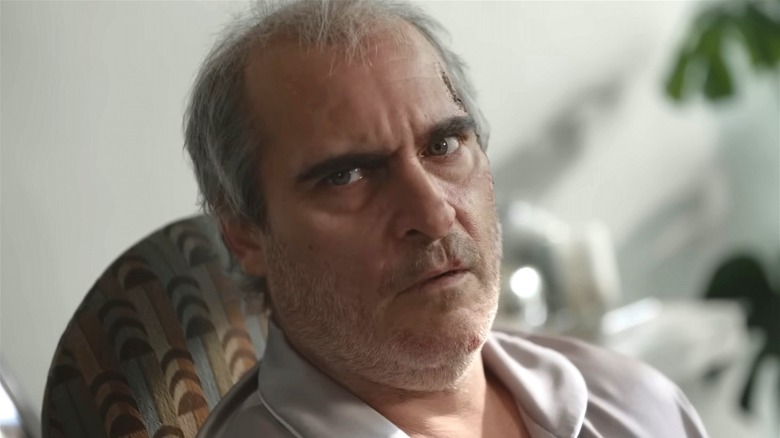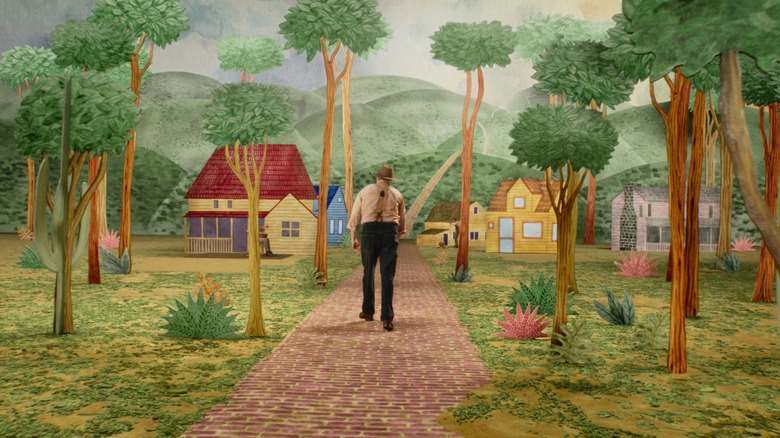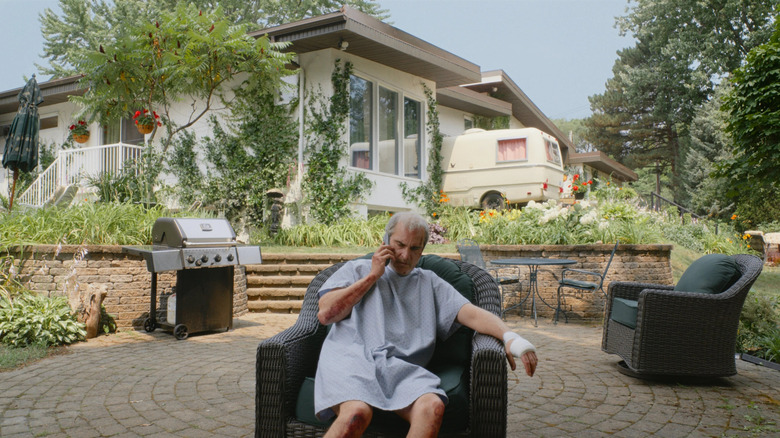Beau Is Afraid Review: Visionary Filmmaking For A Tiring Vision
- Stunning, humorous production design
- Individual vignettes hold interest
- Expertly depicts anxiety
- At three hours long with a flat protagonist, it becomes extremely draining
Is "Beau Is Afraid," the third feature film from Ari Aster, a horror movie or a comedy? The best answer I can give is "yes and no." When you describe a movie as a "horror-comedy," you typically think of something like "Shaun of the Dead" or "Cabin in the Woods." Maybe "Ghostbusters" or "Beetlejuice" on the more comedy-focused end of the spectrum, or arguably "Get Out" or "American Psycho" on the more horror-focused end. "Beau Is Afraid" doesn't really fit any of those molds. There are enough jokes to qualify it as comedy and it's disturbing enough to count as horror, but I'm not sure how much either of those descriptors fit the primary emotional response it invokes.
If I had to pin this seemingly undefinable film to a genre, I'd define "Beau Is Afraid" as "Jewish anxiety cinema," along the lines of "A Serious Man," "Shiva Baby," or "Uncut Gems" but taken to a further extreme. It's three nonstop hours of stress, neurosis, and inherited familial trauma, leavened with elements of satire, self-deprecating humor, and wacky surrealism but primarily designed to just make you feel bad. It's as easy to admire the incredible artistic effort that went into the film as it is to never want to watch it ever again.
A strange episodic odyssey
The plot of "Beau Is Afraid" can be described as an episodic series of vignettes, all driven by the journey of Beau Wasserman (Joaquin Phoenix as an adult, Armen Nahapetian in childhood flashbacks) to attend the funeral of his overbearing mother Mona (Patti LuPone and Zoe Lister-Jones at different ages). Mona was a successful businesswoman whose company produces an array of absurd products; Beau, in contrast, lives in a crappy apartment he can barely do anything in but is scared to leave. The setting of the first act is a satirical caricature of every anxiety about city life: assault rifles in the street to scare liberals, socialist billboards to scare conservatives, lack of personal space to scare introverts, and naked serial killers running around to scare everyone.
This first act is probably the most effective overall in terms of sheer dark comedy. Everything that can go wrong does go wrong, and in such over-the-top ways, you have to laugh through the cringe. The next extended segment, in which an injured Beau is being nursed back to health by an eerily friendly suburban couple (Nathan Lane and Amy Ryan), has its own intrigues and social commentary that could have been developed further, as well as the first hints of a bigger conspiracy. A visit to a traveling theater troupe in the woods might be the most captivating vignette overall, both due to its gorgeous use of animation and how its playful tonal shifts allow for a subtler, more subversive sense of horror.
As for what happens when Beau finally makes it to his destination ... well, I'm not going to spoil anything, but it's a lot. His extreme sexual repression is explored in ways that are sometimes hilarious and at other times just incredibly stupid. There are moments of outstanding acting amidst reality-bending story twists that might have held greater impact if we could assign any level of reality to any part of this story. By the time the credits roll, you'll be left utterly exhausted and worn out — which is what Aster wants, though probably not what most moviegoers are looking for.
Am I too well-adjusted for this movie?
My general impression of Ari Aster's filmmaking is he's a potentially great director who has yet to make a great movie. Of his two previous horror movies, I preferred "Midsommar" to "Hereditary," in large part because "Midsommar" had more of a sense of humor. In theory, Aster heading further into darkly comedic territory with "Beau Is Afraid" should be right up my alley. Very few comedies, however, can sustain a three-hour runtime, and this film's biggest obstacle to greatness is that it's just way too long.
Regularly changing around the setting and supporting characters helps to keep things interesting — the sheer quantity of production design gags alone is enough to keep the film from boredom. All this variety, however, can't change the fact that Beau is an extremely one-note character, and spending three hours seeing the world through his depressing distorted perspective eventually loses its initially thrilling novelty and ends up feeling like something of a chore.
Maybe I just have too healthy a relationship with my mother to really get this movie? It's kind of funny that A24's most expensive production yet is in some ways the polar opposite of the studio's biggest hit, "Everything Everywhere All at Once." Perhaps those who deemed the best picture winner's story of a mother apologizing to her hurt child overly idealistic will find some sort of catharsis in Aster's depiction of a man whose every waking moment is being psychologically tortured by his mom. Patti LuPone certainly sells the hell out of this monster-mother role in her brief but memorable on-screen appearances.
As ambivalent as my personal feelings are about "Beau Is Afraid," I do get the sense such ambivalence is Aster's intended response to this weird and challenging film. This is absolutely a visionary piece of cinema, achieving its ambitious goals with top-notch artistry. Whether or not this particular vision is one you wish to experience is another story.
"Beau Is Afraid" opens in NY and LA on April 14 before opening nationwide on April 21.


